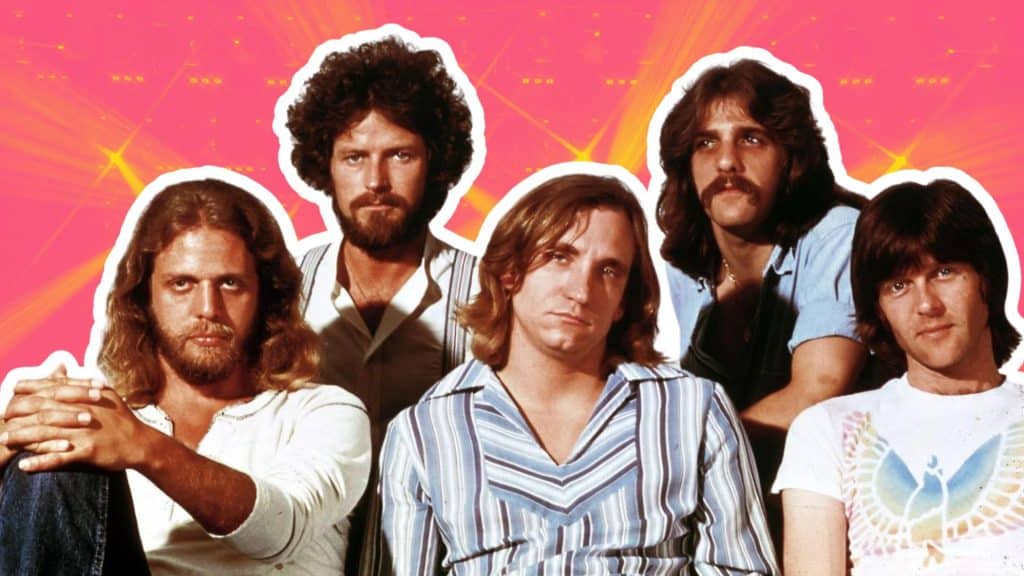When you think of legendary rock bands, the Eagles undoubtedly come to mind.
Their music is etched into the fabric of American culture.
At the heart of their timeless sound were two unforgettable voices that captivated millions – Glenn Frey and Don Henley.
But what made these lead singers extraordinary, their vocals resonating with power and emotion?
Was it their raw talent, ability to craft poetic lyrics, or sheer charisma they exuded on stage?
Join us as we delve into the remarkable qualities that propelled Frey and Henley to icon status, unraveling the secrets behind their spellbinding performances that continue to inspire generations of music lovers.
Glenn Frey: Early Life and Musical Beginnings

1. Birth and Early Years
Glenn Frey, the lead singer, was born in Detroit, Michigan, a city renowned for its vibrant music scene and the birthplace of Motown.
Growing up surrounded by the soulful sounds of rhythm and blues, he developed an innate appreciation for music from a tender age.
Family and Childhood
His parents, though not musicians themselves, fostered an environment that nurtured his creative spirit.
Family gatherings were often filled with the melodies of classic rock and folk tunes, planting the seeds of his future musical endeavors.
First Musical Encounters
From an early age, he was drawn to the rhythmic beats and melodies that filled the airwaves.
Listening to records and attending local concerts ignited his passion. He was captivated by music’s raw energy and storytelling power.
2. Initial Interest and Involvement in Music
Starting with Instruments
By age five, his natural inclination towards music had blossomed, and he began taking piano lessons.
As he grew older, he discovered the guitar, an instrument that would become his creative canvas for self-expression.
Early Music Lessons
While he received some formal training, his hunger for knowledge drove him to explore music independently.
He spent countless hours honing his craft, practicing chords, and experimenting with different styles and genres.
Inspirational Figures
During his formative years, he drew inspiration from diverse musicians, ranging from the soulful crooners of Motown to the introspective songwriters of the folk revival.
These influences would later shape his unique artistic voice.
First Bands
As a teenager, he began to channel his musical passion into forming his bands.
One of his earliest groups was called the Subterraneans, named after the iconic novel by Jack Kerouac.
In these early ensembles, he honed his skills as a vocalist, guitarist, and songwriter, laying the foundation for his future success.
Key Collaborations
A pivotal moment in his musical journey came when he crossed paths with fellow Detroit native Bob Seger.
Their collaboration introduced him to the world of professional music and provided invaluable mentorship and encouragement.
Seger’s influence helped shape his songwriting abilities and understanding of the industry.
Musical Development
These early experiences and collaborations were instrumental in refining his unique style.
He began to blend rock’s gritty authenticity with folk storytelling elements, creating a sound that was both familiar and refreshingly new.
His stage presence evolved as he learned to captivate audiences with his charismatic vocals and energetic performances.
Through his formative years, the lead singer of the Eagles cultivated a deep appreciation for music and honed his skills, driven by a relentless passion and a desire to forge his path.
These early experiences laid the groundwork for his eventual rise to legendary status as he continued pushing boundaries and creating music that resonated with audiences worldwide.
Formation of the Eagles
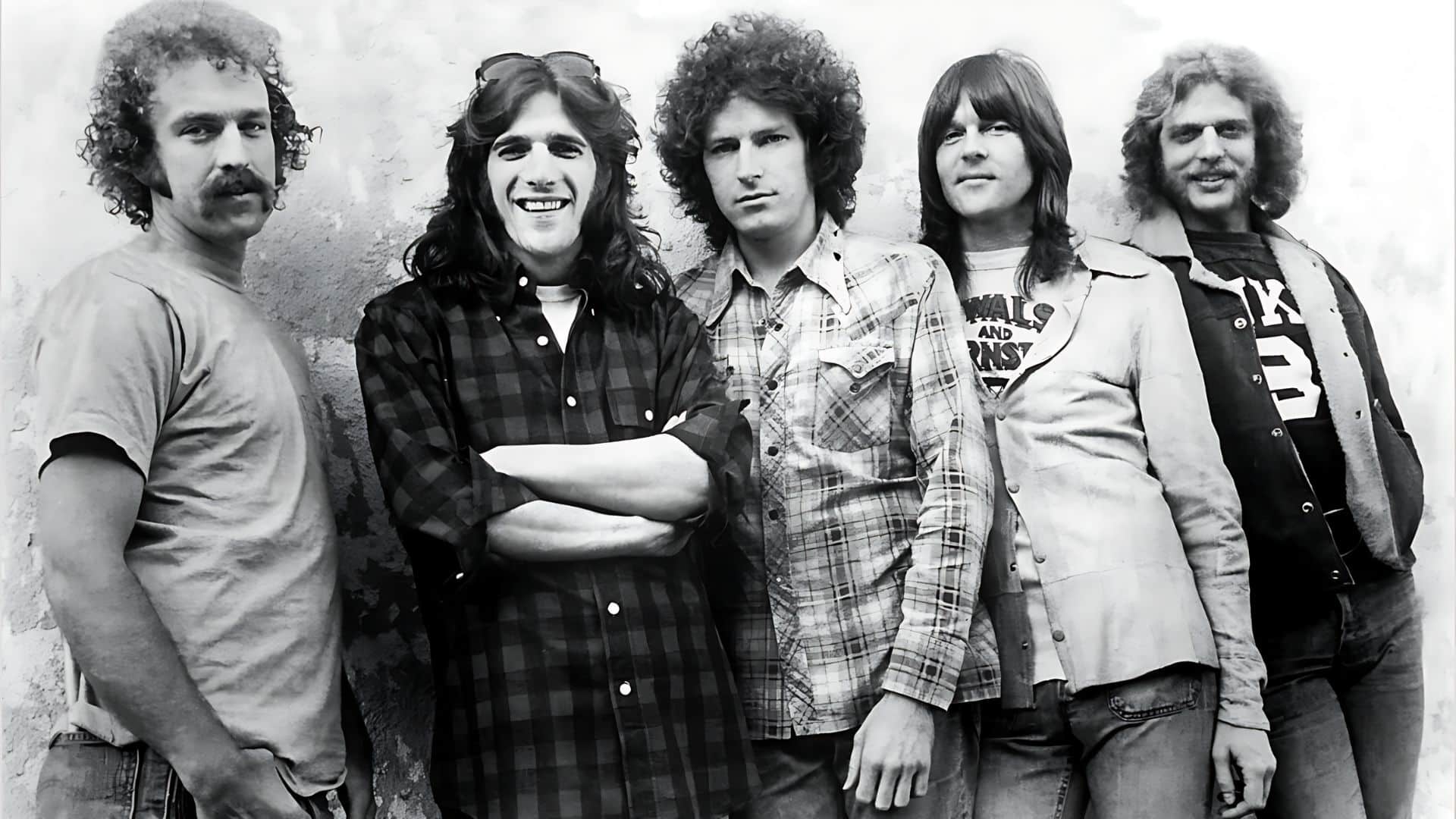
1. Meeting with Don Henley and Other Founding Members
Key Members
The story of the Eagles begins with four talented musicians – Glenn Frey, Don Henley, Bernie Leadon, and Randy Meisner – who would come together to create one of the most iconic rock bands ever.
How They Met
In 1970, Frey and Henley crossed paths in Los Angeles at the renowned Troubadour club.
Both were signed to the same record label, Amos Records, which facilitated their initial connection.
Their shared musical interests and complementary talents laid the foundation for a fruitful partnership.
Joining Linda Ronstadt
A pivotal moment came when Frey and Henley were recruited to join Linda Ronstadt’s backing band for her 1971 tour.
During this tour, they met and played alongside Bernie Leadon and Randy Meisner, two musicians who would become integral parts of the Eagles’ early lineup.
2. Formation of the Eagles and Initial Success
The Decision To Form a Band
Inspired by their touring experience with Ronstadt, Frey, and Henley recognized their creative chemistry and formed their band.
This bold move set the stage for a legendary musical journey.
Choosing the Name ‘Eagles’
The band’s name was born during a peyote and tequila-influenced excursion to the Mojave Desert.
As they witnessed eagles soaring overhead, the symbolism resonated with the group, and the name “Eagles” was chosen, representing freedom, strength, and a soaring spirit.
Signing with Asylum Records
In 1971, the newly formed Eagles signed with David Geffen’s Asylum Records, a label that would become instrumental in their meteoric rise to fame.
First Performance
Their debut performance as “Teen King and the Emergencies” took place in October 1971 at a club called The Gallery in Aspen, Colorado, setting the stage for their future success.
3. Notable Early Songs and Albums
Debut Album ‘Eagles’ (1972)
- ‘Take It Easy’: Co-written by Frey and Jackson Browne, this laid-back country-rock hit became an instant classic and showcased their signature harmonies.
- ‘Witchy Woman’: Driven by Henley’s distinctive vocals, this song introduced the band’s darker, more mystical side and became a chart-topping success.
- ‘Peaceful Easy Feeling’: A mellow, introspective track that encapsulates the band’s unique blend of rock and folk influences, cementing their place in the emerging country-rock genre.
Follow-Up Album ‘Desperado’ (1973)
- Concept and Theme: Embracing a Western outlaw motif, this album explored themes of freedom, adventure, and the consequences of a reckless lifestyle.
- Key Tracks: “Tequila Sunrise” and the title track “Desperado” became standouts, showcasing the band’s storytelling abilities and Henley’s expressive vocals.
‘On the Border’ (1974)
- Shift in Style: With this album, the Eagles began incorporating a harder rock edge into their sound, expanding their musical horizons.
- Introduction of Don Felder: Adding guitarist Don Felder brought a new dimension to their music, contributing to tracks like “Already Gone.”
- The Success of ‘already Gone’: This up-tempo rocker showcased Frey’s vocals and became a significant hit, foreshadowing their future commercial success.
- “Best of My Love”: This track marked the Eagles’ first number-one single, cementing their status as a force to be reckoned with in the music industry.
Glenn Frey Contributions to the Eagles
Glenn Frey’s contributions to the Eagles were pivotal in shaping the band’s extraordinary success and enduring legacy.
As a co-founder, prolific songwriter, and captivating lead vocalist, his talents left an indelible mark on the Eagles’ iconic sound and timeless appeal.
1. Songwriting and Vocal Contributions Collaborative Efforts
Frey’s partnership with Don Henley was the driving force behind many of the Eagles’ greatest hits.
They co-wrote masterpieces like “Hotel California” and “Desperado,” blending their distinct songwriting styles into a cohesive and powerful artistic vision.
With his rich, soulful voice, Frey took the lead on numerous tracks and became the Eagles’ unmistakable voice.
His distinct vocals on songs like “Take It Easy” and “Tequila Sunrise” resonated with audiences, delivering the perfect blend of grit and emotion.
2. Iconic Songs Led by the Lead Singer “Take It Easy”
Co-written with Jackson Browne, this laid-back anthem became an instant classic and the band’s debut single.
Frey’s effortless delivery and the song’s relatable lyrics made it an enduring fan favorite, embodying the spirit of the Eagles.
“New Kid in Town”
Frey’s smooth vocals on this hit showcased his versatility as a singer.
The song’s commercial success, including a Grammy win for “Best Arrangement for Voices,” cemented its place in the Eagles’ pantheon of hits.
Other Hits
Beyond the standouts, Frey’s vocals graced numerous other Eagles classics, including the introspective “Peaceful Easy Feeling,” the hard-rocking “Already Gone,” and the emotionally charged “Lyin’ Eyes.”
3. Evolution of Musical Style and Influence on the Band’s Direction Early Sound
The Eagles’ initial country-rock style was heavily influenced by Frey’s sensibilities, blending rock, country, and folk elements.
His songwriting and vocal delivery were instrumental in shaping the band’s distinctive sound during this formative period.
Shift to Rock
As the band evolved, Frey’s creative vision was crucial in transitioning to a more rock-oriented style.
Adding guitarist Joe Walsh and the harder edge on albums like “Hotel California” reflected Frey’s willingness to push the boundaries and explore new musical territories.
Creative Leadership
Frey’s leadership extended beyond his musical contributions.
He was pivotal in guiding the band’s thematic and lyrical direction, balancing commercial success with artistic integrity.
His influence ensured that the Eagles’ music resonated with audiences while retaining its depth and authenticity.
Glenn Frey’s legacy as a founding member, songwriter, and lead vocalist of the Eagles is etched into the fabric of rock history.
His remarkable contributions, from the memorable hooks of “Take It Easy” to the haunting storytelling of “Hotel California,” were instrumental in propelling the Eagles to stratospheric success.
Frey’s artistic vision, captivating vocals, and collaborative spirit solidified the band’s place as one of rock music’s most iconic and enduring forces.
The Eagles as a Band
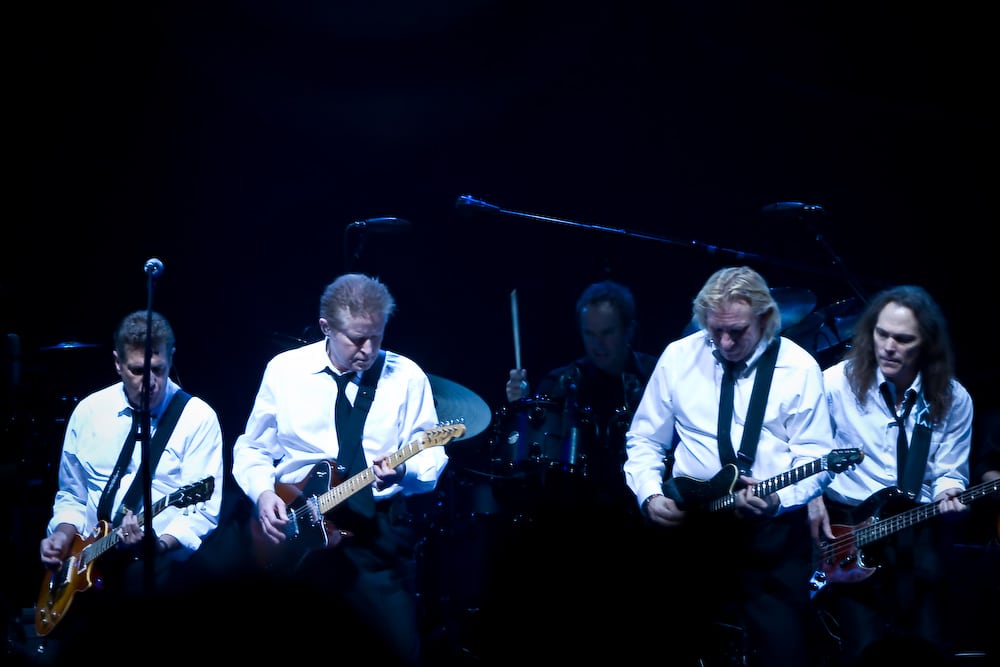
1. Band’s Formation and Key Milestones Formation
The Eagles’ story began in Los Angeles in 1971, when Glenn Frey and Don Henley, whom Linda Ronstadt had recruited for her backing band, decided to embark on their musical journey.
This fateful decision laid the foundation for one of the most successful and influential rock bands ever.
Early Success
The Eagles quickly found their footing with releasing their self-titled debut album in 1972.
Songs like “Take It Easy” and “Witchy Woman” introduced the world to the band’s distinctive blend of country, rock, and folk influences, igniting their meteoric rise to stardom.
Key Milestone
- 1975: The release of “One of These Nights” marked the band’s first number-one album, solidifying their status as a force to be reckoned with in the music industry.
- 1976: The iconic album “Hotel California” became a cultural phenomenon, cementing the Eagles’ place among the best-selling and most acclaimed bands ever.
- 1980: After years of unparalleled success, the band parted ways, only to reunite in 1994 for the highly anticipated “Hell Freezes Over” tour and album.
- 2007: Nearly three decades after their last studio release, the Eagles proved their enduring relevance with “Long Road Out of Eden,” showcasing their ability to evolve while staying true to their roots.
2. Contributions of Other Members
Don Henley

Sharing co-lead vocal duties with Glenn Frey, Henley’s powerful and expressive voice and exceptional songwriting skills played a pivotal role in shaping the Eagles’ sound.
His contributions include iconic tracks like “Hotel California” and “Desperado.”
Joe Walsh

Walsh joined the band in 1975, virtuosic guitar skills and hard-rock sensibilities added a new dimension to the Eagles’ music.
His influence can be heard on standout tracks like “Life in the Fast Lane,” contributing to the band’s evolution into a more rock-oriented sound.
Timothy B. Schmit

Replacing Randy Meisner in 1977, Schmit’s rich vocals and harmonies became integral to the Eagles’ later work.
His soulful lead on “I Can’t Tell You Why” showcased his talent and versatility.
Bernie Leadon
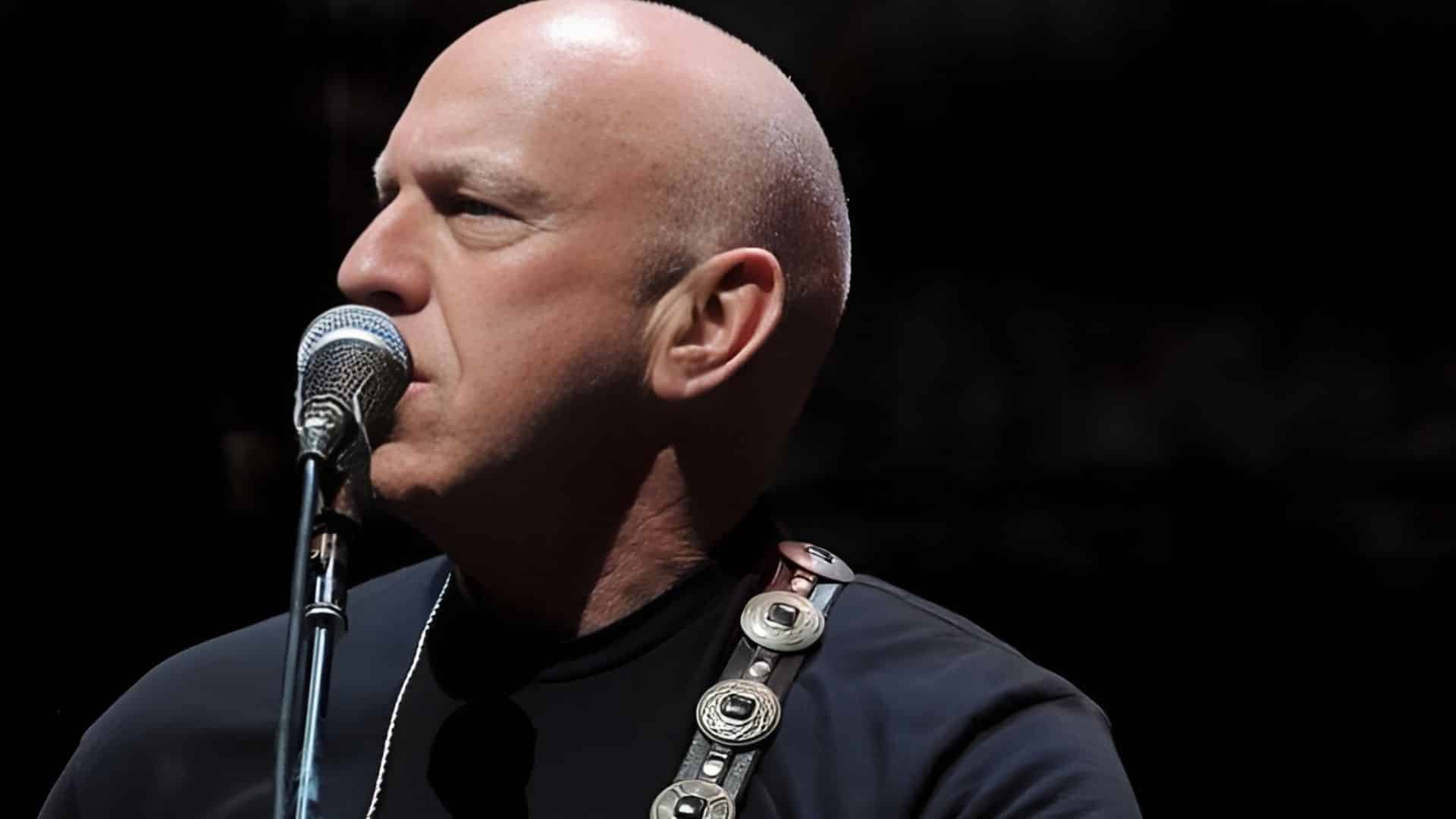
As a founding member, Leadon’s country-rock influences were instrumental in defining the band’s early sound.
His contributions include beloved hits like “Take It Easy” and “Witchy Woman.”
Randy Meisner

The original bassist and vocalist Meisner’s soaring vocals on “Take It to the Limit” became one of the band’s most iconic moments, showcasing their ability to blend multiple voices seamlessly.
3. Major Albums and Their Impact on Rock Music Eagles (1972)
With their debut album, the Eagles introduced their signature country-rock sound to the world, featuring timeless hits like “Take It Easy” and “Peaceful Easy Feeling.”
- Desperado (1973): A concept album with a Wild West theme, “Desperado” showcased the band’s storytelling prowess with tracks like the haunting title song and the upbeat “Tequila Sunrise.”
- On the Border (1974): Marking a shift towards a harder rock sound, “On the Border” included the hit “Already Gone” and their first number-one single, “Best of My Love.”
- One of These Nights (1975): This album solidified the Eagles’ commercial success, featuring chart-topping hits like “Lyin’ Eyes” and the infectious title track.
- Hotel California (1976): A true masterpiece, “Hotel California” cemented the Eagles’ legacy as one of the most influential rock bands ever. From the haunting title track to the dynamic “Life in the Fast Lane,” this album explored themes of excess and disillusionment, captivating audiences worldwide.
- The Long Run (1979): Continuing their streak of success, “The Long Run” delivered hits like “Heartache Tonight” and the soulful “I Can’t Tell You Why,” showcasing the band’s versatility and songwriting prowess.
- Hell Freezes Over (1994): After a 14-year hiatus, the Eagles reunited with this album, featuring live performances and new tracks. This reignited their popularity and introduced their music to a new generation of fans.
- Long Road Out of Eden (2007): Defying expectations, the Eagles released their first studio album in nearly three decades, proving their enduring talent and relevance with songs that captured the essence of their iconic sound while embracing contemporary influences.
Glenn Frey: Solo Career and Collaborations

Beyond his iconic role as the lead singer and co-founder of the Eagles, Glenn Frey carved out an impressive and influential solo career during the band’s hiatus and after their reunion.
His success as a solo artist further cemented his status as a legendary figure in the music industry.
1. Success During the Eagles’ Hiatus
When the Eagles parted ways in 1980, Frey seized the opportunity to explore his artistic vision as a solo performer.
In 1982, he released his debut solo album, “No Fun Aloud,” which showcased his versatility and songwriting prowess.
The album spawned the hit single “The One You Love,” cementing Frey’s ability to resonate with audiences beyond the Eagles’ fanbase.
Frey achieved significant milestones during this period, including chart-topping singles and prestigious awards.
His solo work garnered critical acclaim, solidifying his reputation as a multifaceted artist capable of transcending the boundaries of the band that launched his career.
2. Key Solo Hits and Their Impact on Popular Culture
Frey’s solo hits left an indelible mark on popular culture, reflecting his ability to tap into the zeitgeist of the time.
“The Heat Is On,” a standout track from the “Beverly Hills Cop” soundtrack, became an instant classic, perfectly capturing the spirit of the iconic film.
Its upbeat tempo and infectious melody made it an enduring hit, still beloved by fans today.
Another notable success was “You Belong to the City,” a song closely associated with the hit TV series “Miami Vice.”
Frey’s expressive vocals and the song’s atmospheric soundscape perfectly encapsulated the show’s neon-lit aesthetic, becoming a cultural touchstone of the 1980s.
Other solo hits, such as “Smuggler’s Blues” and “True Love,” further solidified Frey’s position as a skilled storyteller and versatile artist capable of exploring diverse genres and themes.
3. Collaborations with Other Artists and Contributions to Soundtracks
Frey collaborated with renowned artists throughout his solo career, creating unforgettable musical moments.
His long-standing partnership with fellow Detroit native Bob Seger resulted in several co-written tracks showcasing their mutual influence and respect for one another’s talents.
Frey’s collaborations with Don Henley on various solo projects highlighted the enduring creative chemistry that fueled the Eagles’ success, even when the band was on hiatus.
Frey’s contributions extended beyond his solo work. He lent his talents to numerous movie and TV soundtracks.
From “The Heat Is On” in “Beverly Hills Cop” to “You Belong to the City” in “Miami Vice,” and “Flip City” in “Ghostbusters II,” Frey’s music became an integral part of the cultural fabric, transcending the boundaries of the recording studio.
4. Benefits of His Solo Career
Glenn Frey’s solo career and collaborations solidified his status as a multifaceted artist and a true popular culture icon.
His ability to craft timeless melodies and poignant lyrics resonated with audiences across generations, ensuring his music’s enduring relevance.
Through his solo endeavors and collaborations, Frey showcased the depth of his talent and his passion for exploring new artistic avenues.
His contributions to movie and TV soundtracks further cemented his legacy, creating a musical tapestry woven into the fabric of popular culture.
Frey’s solo career and collaborations reinforced his legendary status. They were a testament to his unwavering dedication to his craft and ability to evolve and adapt to the ever-changing musical landscape.
His impact on music and popular culture will continue reverberating for generations.
Glenn Frey: Legacy and Influence
The lead singer of the Eagles, Glenn Frey, left an indelible mark on the music industry that continues to reverberate long after his passing.
His contributions as a co-founder, lead vocalist, and songwriter for the iconic rock band and his successful solo career have solidified his status as a true legend.
Numerous awards and recognitions testify to his enduring influence on generations of musicians and music lovers.
1. Awards and Recognitions Grammy Awards
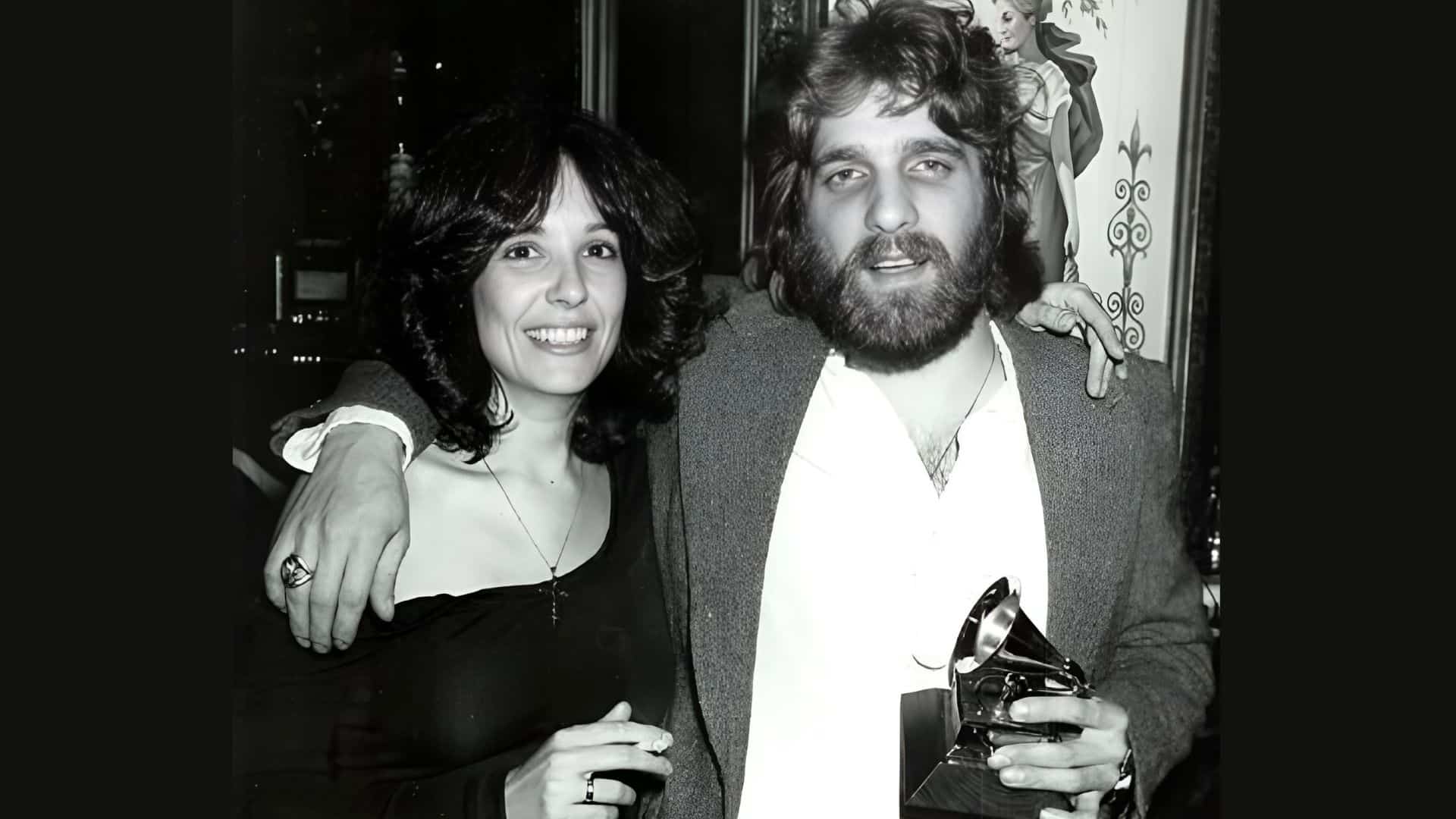
Throughout his illustrious career, Glenn Frey amassed numerous Grammy Awards as a member of the Eagles and a solo artist.
With the Eagles, he won six Grammy Awards, including the coveted “Record of the Year” for the timeless hit “Hotel California.”
As a solo artist, he earned critical acclaim and a Grammy for his chart-topping single “The Heat Is On,” featured in the iconic film “Beverly Hills Cop.”
Rock and Roll Hall of Fame Induction
In 1998, Glenn Frey and the Eagles were inducted into the Rock and Roll Hall of Fame, cementing their place among music history’s most influential and iconic bands.
This prestigious honor recognized their collective achievements and underscored Frey’s pivotal role in shaping the band’s distinct sound and writing some of their most beloved songs.
Other Awards
Beyond his Grammy accolades and the Rock and Roll Hall of Fame induction, Glenn Frey’s talent and impact were celebrated with numerous other awards, including five American Music Awards with the Eagles and an honorary Doctorate of Music from the esteemed Berklee College of Music.
2. Influence on Other Musicians and the Music Industry Direct Influence
Glenn Frey’s vocal prowess, songwriting abilities, and stage presence have inspired countless musicians across genres.
Artists such as Bob Seger, Jackson Browne, and Bruce Springsteen have cited Frey and the Eagles as significant influences on their artistic journeys.
His passionate vocals and storytelling lyrics have left an indelible mark on the songwriting craft.
Collaborations and Mentorship
Throughout his career, Frey fostered numerous collaborations with other renowned musicians, including his long-standing partnership with Don Henley and his work with Bob Seger.
These collaborations not only produced timeless music but also served as mentorship opportunities, where Frey shared his expertise and helped shape the careers of other artists.
Industry Impact
Glenn Frey’s contributions to developing rock and country rock genres cannot be overstated.
His work with the Eagles, particularly on albums like “Hotel California” and “Desperado,” redefined the boundaries of these genres and set new standards for musical storytelling and production techniques.
Frey’s innovative approach to songwriting and performance has inspired countless artists and continues to shape the industry.
3. Lasting Impact of His Work with the Eagles and as a Solo Artist With the Eagles
Glenn Frey’s impact on the Eagles is immeasurable.
His distinctive vocals and songwriting prowess were instrumental in creating some of the band’s most iconic hits, such as “Hotel California,” “Take It Easy,” and “Lyin’ Eyes.”
These songs have transcended generations and remain beloved anthems, forever etched into the fabric of rock music.
Solo Career
Even as a solo artist, Glenn Frey left an indelible mark on popular culture.
Songs like “The Heat Is On” and “You Belong to the City” became cultural touchstones, intertwined with the iconic films and TV shows they were featured in.
Frey’s ability to successfully transition from a band member to a solo artist showcased his versatility and adaptability as a musician.
Cultural and Musical Legacy
Glenn Frey’s music resonates with audiences today, a testament to its timeless appeal and cultural significance.
New generations of artists pay tribute to his work through covers and reimaginings, ensuring his legacy endures.
Frey’s contributions have shaped the sound of an era and inspired countless musicians to follow in his footsteps, perpetuating his influence on the music industry.
Glenn Frey’s legacy as the lead singer of the Eagles and a renowned solo artist is etched into the annals of music history.
His contributions transcend the boundaries of genre and time, leaving an indelible mark on the hearts and minds of music lovers worldwide.
From his iconic vocals on “Hotel California” to his chart-topping solo hits, Frey’s music has become the soundtrack to countless moments and experiences.
Glenn Frey has solidified his status as a legendary figure in the music industry through his unwavering dedication to his craft, innovative approach to songwriting, and profound ability to connect with audiences.
His influence continues to inspire and guide new generations of artists, ensuring that his lasting impact will reverberate for years.
Glenn Frey: Personal Life and Challenges
While Glenn Frey’s musical achievements and impact on the industry are widely celebrated, understanding his personal life and challenges is crucial to fully appreciating his remarkable journey and enduring legacy.
Behind the scenes, Frey navigated personal relationships, family dynamics, and significant health battles, all while continuing to create and perform his beloved music.
1. Personal Life Marriages and Relationships
Two significant marriages marked Frey’s personal life.
In 1983, he married artist Janie Beggs, though their union ended in divorce five years later.
In 1990, he found lasting love with dancer and choreographer Cindy Millican, who remained married until his passing.
Children
Frey was a devoted father to three children: Taylor (born 1991), Deacon (born 1993), and Otis (born 2002).
His son Deacon would later follow in his footsteps, joining the Eagles as a singer and guitarist following his father’s passing, ensuring that Frey’s musical legacy would continue to resonate on stage.
2. Health Issues and Career Impact Rheumatoid Arthritis Diagnosis
In 2000, Frey received a devastating diagnosis of rheumatoid arthritis, a chronic autoimmune disorder that would significantly impact his health and career.
The condition affected his joints, making it increasingly challenging for him to perform and contribute to the Eagles as he once had.
Complications
The medications prescribed to manage Frey’s rheumatoid arthritis eventually led to the development of other severe health issues, including colitis and pneumonia.
These complications forced the Eagles to postpone performances and surgeries as Frey’s health became a constant concern and battle.
3. Passing and Public Reaction Death
On January 18, 2016, Glenn Frey tragically passed away at the age of 67 at Columbia University Medical Center in New York City.
The official causes of his death were complications from rheumatoid arthritis, acute ulcerative colitis, and pneumonia, which led to his placement in a medically induced coma.
Public Reaction
Frey’s passing was met with an outpouring of grief and tributes from fans, fellow musicians, and his bandmates.
Don Henley, Joe Walsh, and other notable figures in the music industry shared heartfelt statements, mourning the loss of a remarkable talent and cherished friend.
Memorials and tributes included a touching performance at the Grammy Awards honoring Frey’s legacy and the unveiling of a life-sized statue in Winslow, Arizona, commemorating his contributions to the iconic song “Take It Easy.”
Glenn Frey’s personal life and the challenges he faced serve as a testament to his resilience and unwavering dedication to his craft.
Despite the obstacles posed by his health issues, he continued to create and perform, leaving an indelible mark on the music world.
Overcoming these challenges only adds to his legendary status, showcasing his determination and passion for his art.
Frey’s ability to persevere through personal trials while maintaining his artistic integrity and producing timeless music further solidifies his place as a true icon in the annals of rock history.
Conclusion
In the annals of rock history, few figures shine as brightly as Glenn Frey, the legendary lead singer of the Eagles.
His soaring vocals, poetic songwriting, and magnetic stage presence left an indelible mark on popular culture.
From anthems like “Hotel California” to solo hits like “The Heat Is On,” Frey’s music has transcended generations, resonating with fans old and new.
While his passing in 2016 was a profound loss, his legacy continues to inspire aspiring musicians and music lovers alike.
So, what’s next for those captivated by Frey’s artistry?
Revisit his timeless catalog, explore the Eagles’ extensive discography, and let his music transport you to a world of storytelling and melody.
Share your fondest memories and tributes in the comments below, ensuring Frey’s legend endures for years.
Frequently Asked Questions
What Were the Significant Health Issues Faced by The Lead Singer of The Eagles?
Frey was diagnosed with rheumatoid arthritis in 2000, leading to colitis and pneumonia complications.
How Did His Marriage and Family Life Influence His Music Career?
His two marriages provided stability, while his children, especially Deacon, became part of his musical legacy.
What Was His Health Problems’ Impact on The Eagles’ Performances and Tours?
The Eagles had to postpone shows and surgeries due to Frey’s health issues like arthritis and colitis.
How Did the Public and Music Industry React to His Passing?
Frey’s passing was mourned by fans, fellow musicians, and bandmates, with tributes and memorials honoring his legacy.
What Contributions Did His Children, Particularly Deacon Frey, Make to The Eagles After His Death?
Deacon Frey joined the Eagles as a singer and guitarist, ensuring his father’s musical legacy continued.


